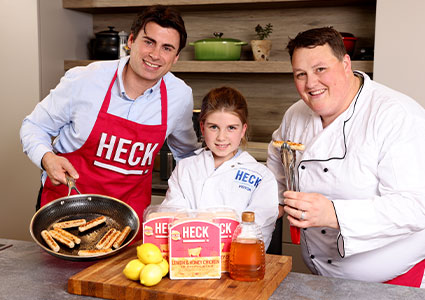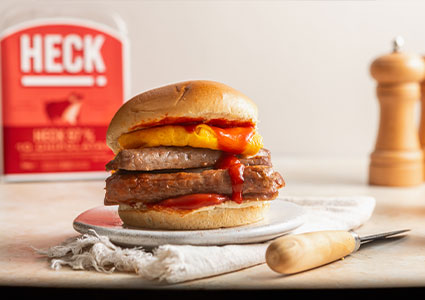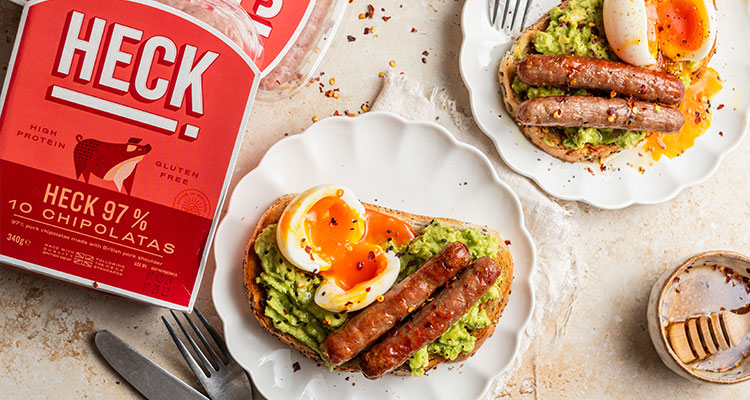Debbie Keeble, Co-founder of British sensation HECK! Food, shares the company’s approach to flavor and sustainability
North Yorkshire’s award-winning sausage manufacturer, HECK! Food has been a staple on the UK’s food shelves since 2013. The company was founded – and is still run – by the Keeble family, who sought to innovate and create great tasting sausages for all tastes and dietary requirements. Debbie Keeble, Co-founder, tells us more about the business. “Before launching HECK!, we noticed that the sausages in supermarkets were all too similar. We wanted to create a complete innovation in the category, keeping to the core principles of offering premium quality sausages, but in a totally different way of packaging and color. We knew that to earn our position on the shelf, we needed to sell a product that was different but still relevant. So, we developed sausages that the supermarkets’ own label wasn’t making, and our concept was very successful. In just five years, our turnover skyrocketed from zero to £17 million at the factory gate.”
 Providing us with greater insight into what makes HECK! Food’s sausages so special, Debbie explains the concept development process behind the brand’s successful products. “Every product we create aims to make a difference. To better understand what our consumers want, we attend countless shows and events around the country where potential customers can sample our sausages. This way, we can identify any barriers that may prevent people from enjoying sausages; for instance if they are celiac, they can only eat gluten-free sausages. In response, we designed our recipes to suit different tastes. We were the first to launch a chicken sausage which has become hugely popular and our entire product range is gluten-free. We are loved by lots of different people as we meet their needs, whether they are into fitness or family or have specific dietary requirements.”
Providing us with greater insight into what makes HECK! Food’s sausages so special, Debbie explains the concept development process behind the brand’s successful products. “Every product we create aims to make a difference. To better understand what our consumers want, we attend countless shows and events around the country where potential customers can sample our sausages. This way, we can identify any barriers that may prevent people from enjoying sausages; for instance if they are celiac, they can only eat gluten-free sausages. In response, we designed our recipes to suit different tastes. We were the first to launch a chicken sausage which has become hugely popular and our entire product range is gluten-free. We are loved by lots of different people as we meet their needs, whether they are into fitness or family or have specific dietary requirements.”
Sustainability strategy
HECK! also offers a vegan range. “In 2014, we released our first vegan collection, called Veg with Edge. These sausages were packed full of vegetables, low in fat, and high in protein and fiber. Although they were delicious, our Veg with Edge sausages were only available in supermarkets for around five years. Recently, the vegan movement has been rapidly growing, with consumers increasingly seeking meat replicas rather than products purely made with vegetables. Consequently, we have gone down the meat replica route, which has been highly successful and is selling more than the Veg with Edge range,” she enlightens.
With health a key consideration throughout its product development, HECK! went the extra mile by collaborating with a dedicated nutritionist. “Alongside sustainability, health is one of our primary strategic pillars. We have hired a nutritionist to help us strengthen our expertise, covering recipe development, ingredient selection, consumer education, and research and development. In today’s world, there are countless challenges and misinformation around health and well-being, especially on social media. Therefore, our nutritionist will help guide us and our customers towards making healthier choices,” Debbie explains.
As touched on earlier, HECK! Food is also deeply committed to sustainability, having spent the past five years learning about best practices and strategies to reduce its impact on the environment. “We began by improving our packaging, with plastic trays made from 90 percent recycled plastic and cardboard made from 100 percent recycled pulp. To date, 100 percent of Heck’s food packaging including the film and ink are recyclable and the cardboard sleeve is suitable for home recycling. 
Recently, we also switched to CleanFlake PET-based plastic trays, labels, and stickers, thereby reducing our annual plastic use by 50 tons. Moreover, we operate a lean factory operation, resulting in minimal waste, and have an on-site recycling program where plastic, paper, and solid waste are sorted into separate bins. We are also in the process of eliminating all non-essentials, such as disposable cups.
“Most recently, we launched our H.E.C.K code, which provides more information on our commitment to Health, Environment, Community, and Kindness. In line with this, we calculate the carbon footprint of every product we make and label it on our sausage packs as part of our transparency and education program. Our customers can simply scan a QR code on the package, which will lead them to a page with more information. This empowers them to make informed decisions about the products they buy,” she continues.
These sustainability initiatives are complemented by HECK’s own work to reach internal targets in terms of carbon footprint, some of which Debbie discusses in more detail. “Back in 2020, we began measuring our Scope 1 and 2 emissions and have since reduced them by approximately 25 percent. Over the last couple of years, we have also started measuring our Scope 3 emissions, which are slightly more challenging to control as they are emitted by our supply chain. In January 2024, we hired our first full-time sustainability officer to strategically drive our commitment by setting short- and long-term emissions reduction targets that adhere to the guidelines of the Paris Agreement. Our sustainability officer is also responsible for developing and implementing a measurable sustainability strategy, as well as monitoring and reporting progress to the board.
“Furthermore, we recently finished working on our emissions reduction modelling program which is integrated into our sales growth targets from now until 2050. The program models every possible action we can take across Scope 1, 2 and 3, accounting for external influences on our sustainability efforts and results, such as UK policy and consumer trends. This has highlighted the challenges ahead. According to the Science Based Targets initiative, we must reduce our greenhouse gas emissions in Scopes 1 and 2 by 90 percent and our FLAG (Forest, Land and Agriculture) emissions by 70 percent before 2050. Achieving these objectives will require a massive collaborative effort with our entire supply chain and farmers.”
As such, the company has already begun working and investing in reducing its carbon footprint. “This year, we spent £150,000 covering our factories’ roofs with 433 solar panels, which generate 200,000 kilowatts of energy annually, reducing our CO2 emissions by 45 tons. Additionally, we invested £44,000 in an energy management system to monitor and optimize energy and the utility usage across our plants. Lastly,” Debbie concludes, “we launched a new electric car scheme, which offers affordable options for employees who want to transition away from fossil fuels and reduce their commuting costs”.
